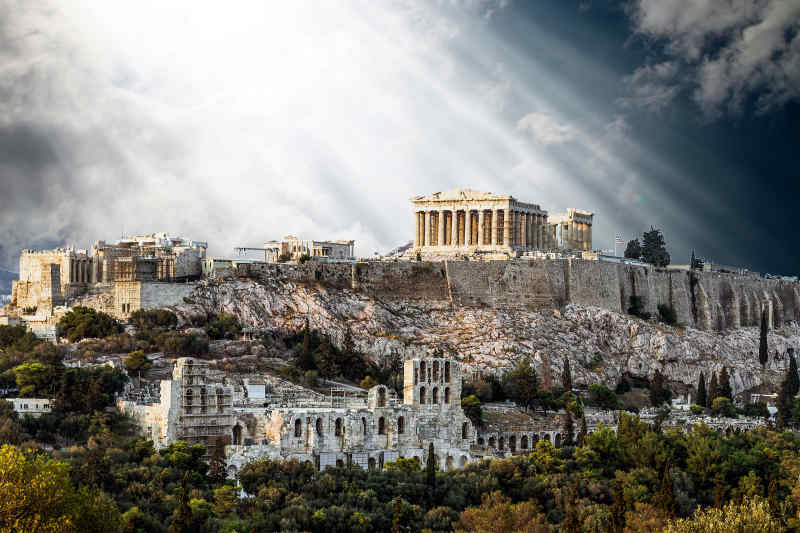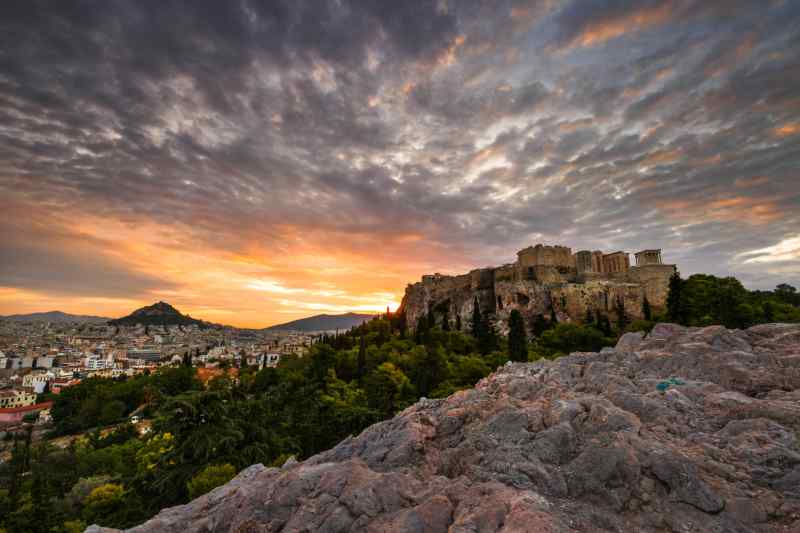By Soren Rivero
Greece is a go-to choice for people who love ancient history, culture, and mythology. Athens, in particular, has tons of historical locations to visit – but with such a wide variety of choices, trying to pick just a few places can be difficult. This list will cover 8 must-see historical locations to visit in Athens!
Parthenon
The Parthenon was built between 445 BCE and 432 BCE and was dedicated to the Olympian Goddess of War and Wisdom, Athena. It was used as a temple for religious practices and sits atop a congregation of other temples known as the Acropolis of Athens. Historians question the actual use of the Parthenon as a religious center as there have been no signs of any altars placed inside. Regardless, the Parthenon has withstood thousands of years of destruction and raids, yet still stands to this day.
Acropolis of Athens
The Acropolis of Athens is an ancient citadel that overlooks the rest of the historic monuments in Athens and houses some of the most important buildings in all of Greece. Because of the Acropolis’ design, the inner buildings (including the Parthenon and the Temple of Athena) have been mostly protected despite being the target of invasions and natural disasters. The Acropolis of Athens is a shining example of both the spiritual and archeological prowess of the Ancient Greeks, and visiting is one of the best things to do in Athens.
Theatre of Dionysus
Not exactly the ‘theatre’ that many of us might be used to seeing, though still remarkable and fascinating nonetheless. The Theatre of Dionysus was constructed around the middle of the sixth century, originally part of the sanctuary of Dionysus — the god of fertility, harvest, and theatre. In fact, the Theatre of Dionysus was the first theatre constructed in Greece and the birthplace of the tragedy genre of plays. It’s homeplace is on the southern end of a slope on Acropolis Hill in Athens.
Temple of Olympian Zeus
The Temple of Olympian Zeus is a fascinating work of art and architecture that shows the sheer power cultivated through human hands alone. Though construction began around the sixth century BCE, it wasn’t finished until 600 years later! It would have been the largest of its kind, perfectly fit for the king of all gods himself, Zeus. It was unfortunately destroyed after a catastrophic barbaric invasion just a century after it was built.
Odeon of Herodes Atticus
The Odeon of Herodes Atticus was a place for people to attend live music ceremonies, and is so large that it originally fit more than 5,000 people. The Odeon was revived in the 20th century and now hosts annual music festivals every summer, where visitors can attend a one-of-a-kind Athens festival with the Odeon lit up in dazzling colors.
Tower of Winds
The Tower of Winds is one of the more lesser-known historical sites in Athens, but don’t let that fool you! With its surrounding garden and buildings, the Tower of Winds sits in the middle of the Roman Agora and was the first meteorological station in the world. Each side of the Tower, of which there are 8 in total, depicts a different Wind God with unique clothing that matches the weather. The Tower also functioned as a sundial, water clock, a compass, and a weathervane. How some of these contraptions worked remains unknown — but maybe you’ll be the one to figure it out on your trip!
Areopagus
Areopagus is a large rock circled by dozens of tall trees on the very northern border of the Acropolis in Athens. It was used as the earliest form of an aristocratic court where the higher-ups would listen and try cases of murder, religious heresy, and other crimes. The name translates simply to “Hill of Ares” which makes plenty of sense considering… well, it's a hilltop. The view is stunning and absolutely worth the climb up!
Hadrian’s Library
Located in between Agora and Athens, these ruins are the remains of the once marvelous library built by Roman Emperor Hadrian. It was the resting place of Athens' most prestigious literary works and even served as a hall for philosophical lectures and discussions. Not much is left of the library aside from a few walls that have yet to crumble, but visitors can still take a walk around the building’s remains.
Visit all of these (or even more) on your trip to Athens!

















